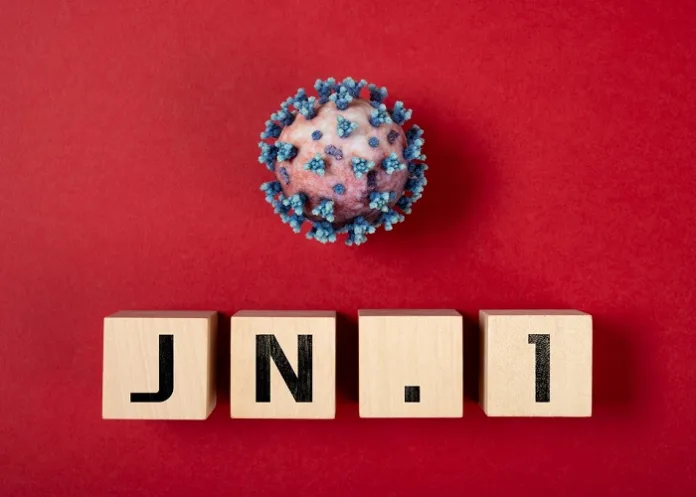Cases of the latest JN.1 Covid-19 variant are continuing to rise, with new infections increasing by 52% during the 28 days leading up to the end of the year, says the World Health Organisation (WHO), describing it as a “variant of concern” (VOC).
In the United States, JN.1 accounts for more than 60% of Covid cases, reports Health Policy Watch, with experts saying the pandemic “is far from over”.
JN.1 is a derivative of the BA.2.86 Omicron subvariant, but with more than 30 mutations. Israeli variant trackers first discovered it in August, and the WHO first spoke about JN.1 in October, when it called it a variant “to keep a close eye on”.
Last month, it had named JN.1 a “variant of interest” (VOI) before now renaming it the more serious VOC.
Although many people are carrying the virus and US Centres for Disease Control & Prevention (CDC) data show that Covid hospital admissions in America have continued to increase over the past two months, it has not caused the same surge as seen with Omicron.
This is also the case in other countries, including Israel where it was first discovered, said Cyrille Cohen, head of the field of life sciences and medicine for the Israel Science Foundation and a professor at Bar-Ilan University.
He said Israel was seeing 10 to 20 cases of severe Covid in hospitals on any given day, compared with 1 400 two years ago.
At the same time, studies are starting to show that the updated Covid vaccines developed by Pfizer, Moderna and others are eliciting antibodies against JN.1 – at least in vitro, he said.
Evaluating JN.1, and what to ask
With a new variant, three questions should be asked, said Peter Chin-Hong, a professor of medicine and infectious disease at the University of California-San Francisco: Is it more transmissible? Do the vaccines work? Does it cause more severe disease?
Is it more transmissible?
Chin-Hong said data indicate JN.1 is more transmissible “because it is rising to the top of the charts very quickly”. At the beginning of November, JN.1 accounted for between 5% and 8% of all US cases. Today it is the most common variant.
Can it evade vaccines?
Generally, no. He said studies show that the vaccine works as long as people are newly inoculated. He recommended jabs for immuno-compromised people with pre-existing medical conditions and over 75s. For these people, he said, “just being infected a year ago and getting the first two shots will not be enough”.
Does it cause more severe disease?
Chin-Hong said there is no evidence JN.1 has caused more severe diseases so far, and no evidence it will. This is true in the countries currently experiencing a rise in the variant, and also from data in Singapore and other countries where JN.1 has been the predominant variant for longer.
He said antiviral drugs like Paxlovid and Remdesivir continue to work to curtail the severity of the virus.
Instead, he said his concern is that JN.1 will exploit the world’s Covid-19 complacency. Most countries have not maintained testing or vaccination, and given its high price tag, many low- and middle-income countries do not have access to drugs like Paxlovid.
Covid-19: ‘a new era’
But Cohen said he believes the world and Covid-19 are “in another era” since WHO ended the virus’ official pandemic status in May 2023. The virus is not the same threat as at the pandemic’s beginning or even during Delta.
That does not mean, however, that the medical and scientific community should not be taking JN.1 or Covid seriously, said Chin-Hong, who believes WHO should give the variant a Greek letter name, like Pi, to “allow governments and people to mobilise” and fight the virus.
“Right now, people are fed up with Covid,” Chin-Hong said. “Giving it a letter will give something to people to latch on to: let’s vaccinate against Pi, get medicines, and have a global talk about sequencing.”
These things have trickle-down effects, he continued. “Giving it a name would also help the everyday person believe he still has something to pay attention to.”
This was not the end of Covid, Cohen believes. As with flu, which has an intense strain every 10-20 years, Covid-19 could also once again have a more dangerous strain.
See more from MedicalBrief archives:
New Covid variant dominates in US
Another new Covid variant alert
UK spike in new Covid variant cases

